 |
| Photo of piggy bank and coins by Tirelire_Avenue at https://pixabay.com/photos/piggy-bank-pig-cash-economy-4757810/ |
U.S. History Week 20
Politics in the Gilded Age, 1870-1900
I designed a quiz related to chapter 20 at the bottom of this article.
Directions for the quiz:
- Scroll down & click on the first thumbnail to enlarge to full screen.
- Choose an answer for each question.
- Click on the graphic to advance to the next screen.
- The correct answer is on the screen following the question.
- Compare your answers with those provided.
- If you cannot easily see the correct answer, check the captions.
An interactive version is available on Kahoot!
Search for this week’s topic by Katrena to find it.
Review the following Chapter 20 pages:
- Introduction
- Political Corruption in Postbellum America
- The Key Political Issues: Patronage, Tariffs, and Gold
- Farmers Revolt in the Populist Era
- Social and Labor Unrest in the 1890s
- Key Terms
- Summary
Practice learning Chapter 20 Key Terms on Quizlet.
Chapter 20 Videos:
- Crash Course: Gilded Age Politics (13:51)
- James Garfield Song (2:31)
- Crash Course: Reconstruction and 1876 (12:59)
- Coxey’s Army (3:21)
- Does the Wonderful Wizard of Oz Have a Hidden Message? (4:43)
Review the following information featuring the U.S.:
Additional Resources:
Thanks for visiting my Student Survive 2 Thrive blog!
Find additional resources through my site map, topics tabs, or search bar.
Here are some of my articles you may find helpful this week:
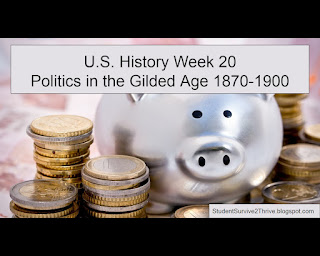 |
| U.S. History Week 20 Politics in the Gilded Age 1870-1900 |
 |
| Created by Katrena All rights reserved. |
 |
| A period in the late 1800s characterized by materialism, personal gain quests, & corruption is the ___. Answer choices include: Gilded Age, American Renaissance, Progressive Era, Dark Age |
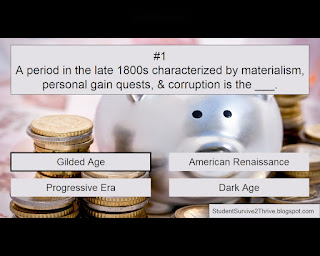 |
| The correct answer is Gilded Age. |
 |
| In the ___ Campaign, voters were reminded of the human toll of the Civil War. Answer choices include: Hard Cider, Bloody Shirt, Red Shirt, Just Say No |
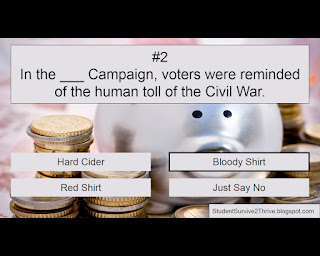 |
| The correct answer is bloody shirt. |
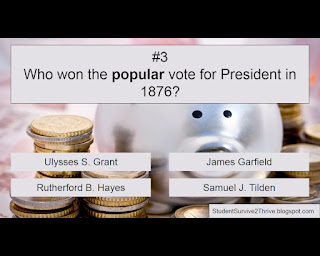 |
| Who won the popular vote for President in 1876? Answer choices include: Ulysses S. Grant, James Garfield, Rutherford B. Hayes, Samuel J. Tilden |
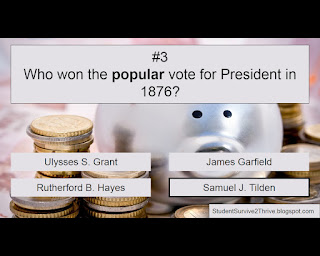 |
| The correct answer is Samuel J. Tilden. |
 |
| The correct answer is The Great Betrayal. |
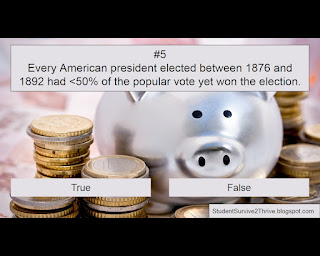 |
| Every American president elected between 1876 and 1892 had <50% of the popular vote yet won the election. Answer choices include: true, false |
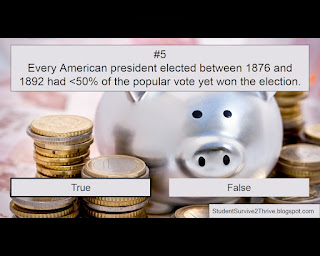 |
| The correct answer is true. |
 |
| Political ___ occurs when an elected official provides favors, such as civil service jobs, to friends and special interest groups. Answer choices include: altruism, service, patronage, fulfillment |
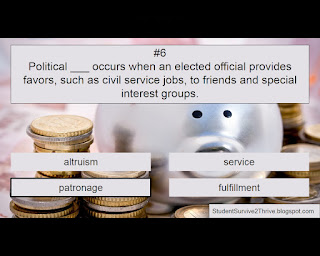 |
| The correct answer is patronage. |
 |
| How did President James A. Garfield die? Answer choices include: drowning at sea, stroke, tuberculosis, infection from a gunshot wound |
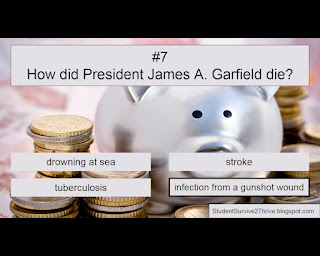 |
| The correct answer is infection from a gunshot wound. |
 |
| In 1883, the Pendleton Civil Service Act set ___% of civil service jobs to be determined by competitive examination. Answer choices include: 5, 10, 25, 50 |
 |
| The correct answer is 10. |
 |
| In 1887, ___ passed the Interstate Commerce Commission designed to ensure reasonable railroad prices. Answer choices include: James Garfield, Chester Arthur, Benjamin Harrison, Grover Cleveland |
 |
| The correct Grover Cleveland. |
 |
| Under William Henry Harrison’s presidency, ___ reached an all-time high in America. Answer choices include: tariffs, jobs, corruption, public support |
 |
| The correct answer is tariffs. |
 |
| The correct answer is farmers. |
 |
| The Patrons of Husbandry (the Grange) encouraged farmers to pool resources as ___. Answer choices include: ecosystems, monopolies, cooperatives, trusts |
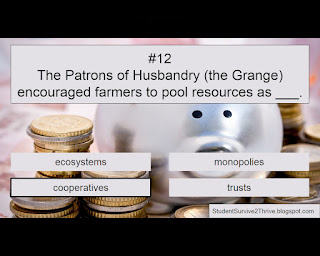 |
| The correct answer is cooperatives. |
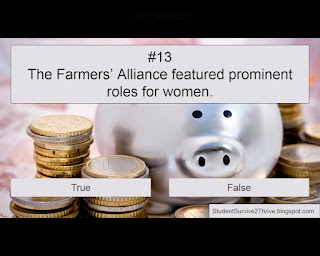 |
| The Farmers’ Alliance featured prominent roles for women. Answer choices include: true, false |
 |
| The correct answer is true. |
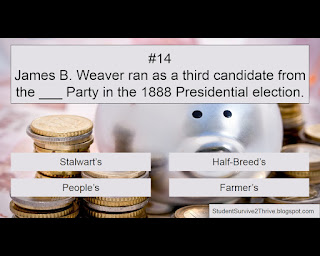 |
| James B. Weaver ran as a third candidate from the ___ Party in the 1888 Presidential election. Answer choices include: Stalwart's, Half-Breed's, People's, Farmers |
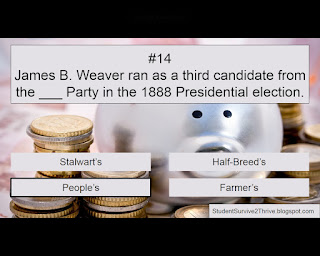 |
| The correct answer is People's. |
 |
| Who was the first U.S. President to be elected to non-consecutive terms? Answer choices include: John Adams, Grover Cleveland, William Henry Harrison, Franklin D. Roosevelt |
 |
| The correct answer is Grover Cleveland. |
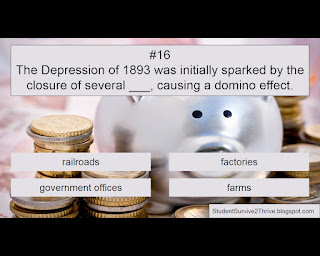 |
| The Depression of 1893 was initially sparked by the closure of several ___, causing a domino effect. Answer choices include: railroads, factories, government offices, farms |
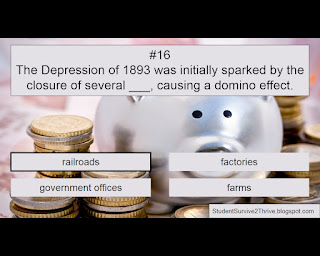 |
| The correct answer is railroads. |
 |
| The correct answer is Coxey's Army. |
 |
| Some say The Wonderful Wizard of Oz is an allegory of period protests. What color were Dorothy’s shoes in the book? Answer choices include: gold, ruby, emerald, silver |
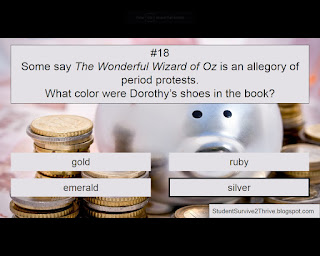 |
| The correct answer is silver. |
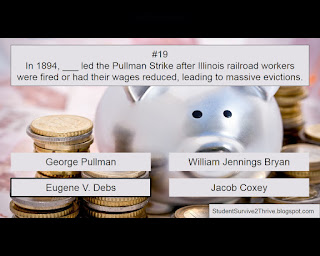 |
| The correct answer is Eugene V. Debs. |
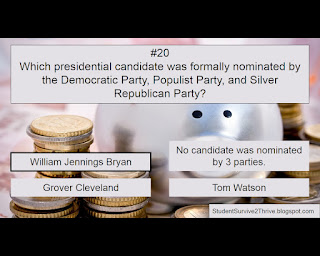 |
| The correct answer is William Jennings Bryan. |
 |
| Find more resources at StudentSurvive2Thrive.blogspot.com |


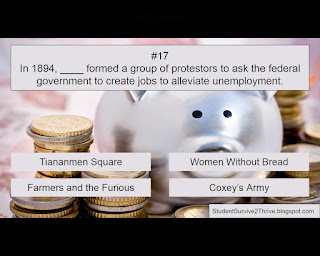


No comments:
Post a Comment
Thanks for reading my article and sending your comment! Please note that I do not place links to other web sites on this blog.
Note: Only a member of this blog may post a comment.